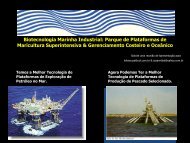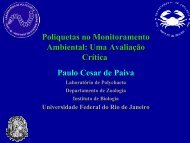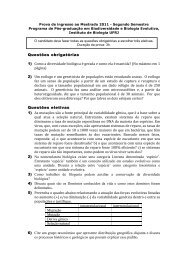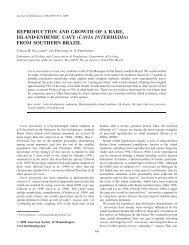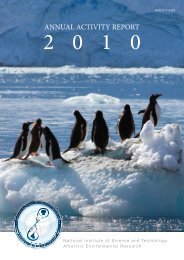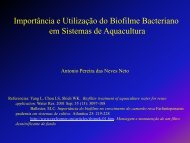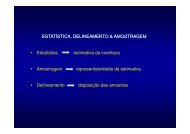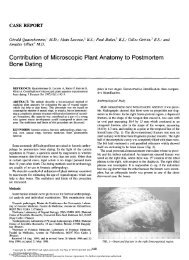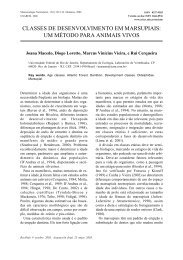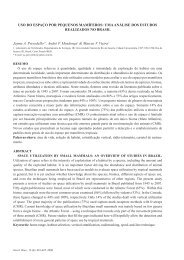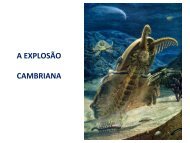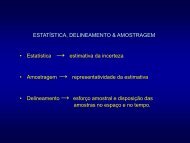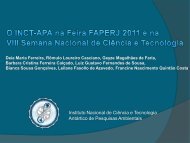1 - Instituto de Biologia da UFRJ
1 - Instituto de Biologia da UFRJ
1 - Instituto de Biologia da UFRJ
Create successful ePaper yourself
Turn your PDF publications into a flip-book with our unique Google optimized e-Paper software.
Team Lea<strong>de</strong>r<br />
Dr. Cristina Engel <strong>de</strong> Alvarez<br />
Vice-Team Lea<strong>de</strong>r<br />
Dr. Alexandre <strong>de</strong> Avila Leripio<br />
The issues related to comfort and security for a building in<br />
Antarctica are also, necessarily, related to environmental<br />
factors, due to the specific characteristics of the Antarctic<br />
environment. Thus, over the years, the group of researcher<br />
scientists related to technology and environmental<br />
management have sought to improve specific aspects, at<br />
certain moments having as their objective the efficacy of<br />
systems already adopted by Brazil at their Brazilian Station<br />
– Coman<strong>da</strong>nte Ferraz (from now on EACF, Portuguese<br />
acronym), and at other times opening new frontiers of study<br />
from the previous results obtained.<br />
This year, among the main results obtained, the most<br />
noteworthy was the research in the field of acoustics, now<br />
with a focus on its influence on the psychological behaviour<br />
of the users. The article, “Relationship between noise and<br />
psychological comfort of the users in the Coman<strong>da</strong>nte Ferraz<br />
Antarctic Station” evaluates the question of noise using as<br />
instrument correlated national and international norms, and<br />
furthermore, offers a warning regarding the conditions of<br />
specific exposure to be consi<strong>de</strong>red in different ambiences<br />
such as might be found in a building in Antarctica.<br />
Attention is called to pioneer research un<strong>de</strong>rtaken in this<br />
period, “Analysis of Indoor Al<strong>de</strong>hy<strong>de</strong>s in the Coman<strong>da</strong>nte<br />
Ferraz Antarctic Station”, which studied the quality of indoor<br />
air, with strong emphasis on volatile organic composites,<br />
especially the al<strong>de</strong>hy<strong>de</strong>s, whose presence in the flooring and<br />
the furniture has reinforced the need for monitoring. In the<br />
research it was established that in some locations of EACF,<br />
the concentration of formal<strong>de</strong>hy<strong>de</strong> surpassed the directives<br />
proposed by the WHO – World Health Organization,<br />
making evi<strong>de</strong>nt the necessity for more attention to this<br />
matter.<br />
The article “Results of internal audit in the environmental<br />
management system of Brazilian Antarctic Scientific Station<br />
Coman<strong>da</strong>nte Ferraz” shows the results of the internal audit<br />
un<strong>de</strong>rtaken between December 2011 and January 2012 at<br />
EACF, having as principle references the Madrid Protocol<br />
and the stan<strong>da</strong>rd ISO 14001:2004. It was verified that<br />
EACF has a partial level of conformity of 86.2% in relation<br />
to the requirements of ISO 14001:2004, which serves as<br />
fun<strong>da</strong>mental information in <strong>de</strong>lineating an Environmental<br />
Management Programme.<br />
If on the one hand there is vital concern in reducing the<br />
impacts occasioned by human occupation of Antarctica, on<br />
the other hand, it is necessary to <strong>de</strong>al with strategies that<br />
seek to recover the consoli<strong>da</strong>ted impacts. In this respect,<br />
the article “Bioremediation of the diesel-contaminated soil<br />
of the Brazilian Antarctic Station”, presents an alternative<br />
proposal for the treatment of areas contaminated by oil –<br />
which inclu<strong>de</strong>s the essential <strong>de</strong>epening of the research -,<br />
especially of those related to the leakage of fuel. The partial<br />
results were obtained from the carrying out of a successful<br />
experiment un<strong>de</strong>rtaken ex situ.<br />
Thus, Thematic Area 4, restates it vocation of incentivising<br />
research in the areas of technology and management<br />
consi<strong>de</strong>ring the useful lifecycle of a building, which<br />
extends from planning (prevention); usage and operation<br />
(management) until the final <strong>de</strong>stination, recycling or<br />
removal of the installations (recovery).<br />
Science Highlights - Thematic Area 4 |<br />
171



